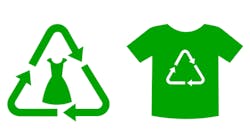Survey Says Consumers Looking to Companies for Sustainability Efforts
A lot of things have changed due to the pandemic and one of them is the demand by customers to ensure their apparel is environmentally sustainable.
A recent global survey by the U.S. Cotton Trust Protocol shows 54% of sustainability leaders at apparel and textile brands say they’ve seen their customers’ demands for environmentally sustainable practices and products increase since the beginning of the COVID-19 pandemic.
And 59% said they believe customers will still continue to prioritize price when making purchases.
The survey found that 43% of respondents believe COVID-19 has had a positive impact on investments in sustainability efforts during this period, while 40% believe it has had a negative impact.
Likewise, they believe their customers are facing the same struggle between their pocketbooks and the environmental concerns -- when asked to rank how they believe customers will prioritize their purchases in the next year, respondents ranked the top two priorities as “Getting the best possible deal” and “Brand or retailer alignment with their personal values.”
“It’s clear that COVID-19 has caused economic challenges up and down the supply chain, but this survey shows that companies and their customers remain focused on sustainability,” says Gary Adams, president of the U.S. Cotton Trust Protocol.
Fifty-four percent of respondents said that their customers’ demands for more environmentally sustainable practices and products has “significantly” or “somewhat” increased since the beginning of the pandemic, and 42% said that those customers are also more vocal in those demands.
Almost half of all respondents seemed to believe that their customers are more likely to hold them accountable at the register for those actions – almost half (48%) said they believed customers would switch brands if their company didn’t meet its sustainability commitments.
While some (9%) report pausing most or all sustainability initiatives due to COVID-19, most companies continue to focus their sustainability efforts on manufacturing (25%), sourcing of raw materials (25%), or traceability (11%).
Geographic Difference
COVID-19’s impact on companies’ investments in sustainability initiatives differs drastically by market – North American respondents are least likely to invest, where only 26% of respondents believe COVID-19 has had a positive impact on sustainability investments at their company.
While in Europe, six out of 10 (63%) respondents said the pandemic has had a positive impact on their company’s sustainability efforts, and in Asia, 46% of respondents said they believe there have been increases in proactive investments in sustainability initiatives.
With Asian-European sustainability initiatives benefiting from the impacts of COVID-19, market-specific conditions may play a larger role in the future of sustainability than global factors.
Increasing Traceability
Many companies are looking for ways to buoy their sustainability programs through the pandemic – focused on holding the course with increased help of outside partnerships (62%) until they can afford to reinvest in big new innovations.
Meanwhile, they are increasingly focused on improving the transparency in environmental reporting (59%); improving sustainability in sourcing (63%), and aligning with external sustainability standards or protocols for their existing programs (59%).
